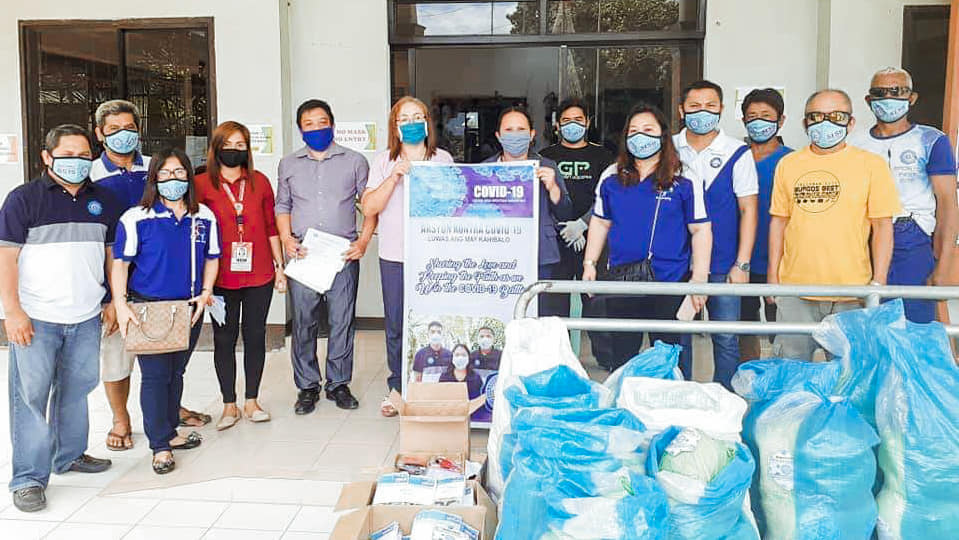Organization
Southern Leyte State University
Best Practice Focus Area/s
Operations
Year Implemented
April 2020 – June 2020
This is a GBPR Entry
Summary
The SLSU offered support in responding to the community’s needs by providing financial assistance and psychosocial counseling to seriously affected students. These are the provision and implementation of enhanced institutional and community preventive measures against COVID-19; production and distribution of SUPPRESS COVID-19 PPEs, IEC materials, and info cast system, production and distribution of SUPPRESS COVID-19 emergency food, development, production, and the deployment of SUPPRESS COVID-19 system and innovations; and establishment of Bayan-Anihan: Aksyon Kontra Gutom.

Background and Problem
The COVID-19 Pandemic has affected people’s lives worldwide. In the Philippines, people in different sectors of society showed varied responses. The operations of Southern Leyte State University (SLSU) have changed. As the only university in the Southern Leyte Province, the SLSU initiated strategies to prevent and protect the community from infection.
SUPPRESS COVID-19 initiatives should be carried out as one holistic program to have a truly unified, proactive, and progressive set of projects and activities to combat the COVID-19 pandemic. To fight as one requires each project component to be successfully implemented. To heal as one, as a common battle cry, essentially requires all the components to be successfully carried out.
Solution and Impact
The SUPPRESS Program was launched to implement a unified, proactive, and progressive response to the COVID-19 pandemic, which impedes the normal flow of things in the province. Methods were applied for manufacturing and quality assurance.
One activity under the SUPPRESS Program is phone anxiety counseling and regular online monitoring among students and employees of the university, which registered Guidance Counselors and Social Workers handle. Proper protocol and procedures are followed with the utmost consideration for the confidentiality and privacy of the engagements. Production of PPEs follows a protocol and ensures that they serve the purpose. Three-ply facemasks are designed with pockets for inserting droplet traps like cloth or other similar materials. Face shields were designed based on the suggestion of medical doctors requesting the same. The production of disinfectants and liquid hand soap strictly observes the Department of Health (DOH) protocol. The preventive measures and systems innovations integrated into this project applied standard and tested theories and practices to ensure that they will benefit the users/consumers without adverse environmental effects.
Emergency food products are outputs of the university’s research and innovation faculty members. These are Intellectual Property (IP) protected and are already adopted by the community and industry. Hence, these are already in the market.
Coordination and Distribution Mechanisms: Coordination with the IATF and DRRM offices in the municipalities of the service has been done to harmonize the university’s actions based on what the community needs. The distribution of the products was based on the request of the frontliners, as suggested by IATF and DRRM, and as proactively viewed by the university based on the current situation of the communities in the service areas. Proper documentation, such as acknowledgment receipts and pictures during product distribution, are considered vital documents.
Through the SUPRESS program of the university, financial assistance, and psycho-social counseling are adequately provided and administered to at least 50 stranded students due to the implementation of ECQ and lockdowns; enhanced institutional preventive measures against COVID-19 are provided and implemented; 7,740 SUPPRESS COVID-19 IEC materials were produced; 6,000 pieces of washable facemasks and improvised facial shields and 200 gals of disinfectants and sanitizers were produced; a substantial volume of emergency foods was processed and produced; automated systems and applications to suppress COVID-19 were developed, and Bayan-Anihan and Backyard FARMacy models were established in selected SLSU campuses. All municipalities in Southern Leyte were the beneficiaries of the program.
Milestones/Next Steps
During the first month of the SUPPRESS Program, the university has undergone a complete procurement process: posting: approved purchase request, Philgeps print-out; canvassing: request for quotation, abstract; bidding: BAC resolution, a notice of award/purchase order; delivery: delivery receipt, inspection, and acceptance report. COVID-19 products such as PPEs, food products, and innovations and services have been carried out and continued until the duration of the program (Month 1-3) with complete documentation. By Month 3, terminal and liquidation reports were submitted to CHED.
